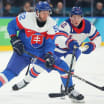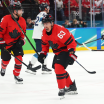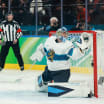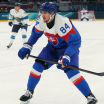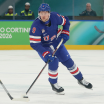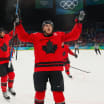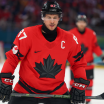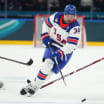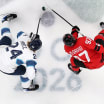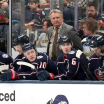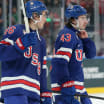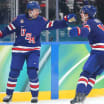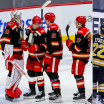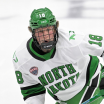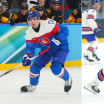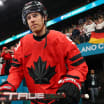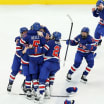With the 1984-85 Edmonton Oilers being voted by fans as the Greatest NHL Team of all time, and four Oilers teams from the 1980s landing in the top 10, author Stu Hackel spoke to the captain of those teams, Wayne Gretzky, in a Q&A for NHL.com.
The League's all-time leading scorer and holder of numerous records, Gretzky also is the NHL's Centennial Ambassador. He rejoined the Oilers as partner and vice chairman of the Oilers Entertainment Group this season.
Here's the conversation with Wayne Gretzky:
Wayne Gretzky talks Greatest NHL Teams
Captain of four Stanley Cup champions with Oilers in '80s discusses what made them elite
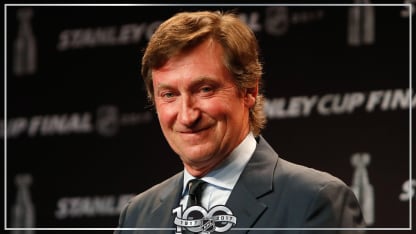
By
Stu Hackel / Special to NHL.com
Just as the phone rang, I was typing Barry Fraser's name, which is quite a coincidence. Not too many people really know the critical role he played in the Edmonton Oilers organization as chief scout, finding so many of the Oilers draft picks, especially in Finland, who made up those great teams.
"Yeah, he was a big catalyst of it. There were a lot of good qualities in what Glen Sather, also known as Slats, the Oilers general manager/coach during this time] did with the organization, but, I guess from the people on the inside, his best quality was that he allowed people he appointed to do jobs and he never really questioned them. I think coming out of the gate really strong, drafting Kevin Lowe and [Mark] Messier and [Glenn Anderson] or [Jari | 1984-85 Edmonton Oilers voted Greatest NHL Team]
Let's talk about Fuhr, who I know you've always held in the highest regard among goalies, even though he never put up glittering numbers the way someone like Ken Dryden did.*
"Two things about Grant: Unfortunately, he was in the wrong organization as far as the style of hockey goes. Our style obviously wasn't conducive to defensive hockey. It was more of an offensive-minded club. Had he been [with the New Jersey Devils or Montreal Canadiens or New York Islanders], Grant's numbers would have been dramatically different because a) the style of play those teams played and b) the style of play was different in the East than the West at that time.
"Secondly, he was the right fit for our organization because statistics and numbers didn't matter to him. All he wanted to do was win, and he didn't care if we won 1-0 or 6-5. And as we went along, it became more and more apparent to us that if it was 2-2 or 4-4 going into the third period that our goaltender was as good a goaltender in clutch situations as anyone who ever played the game. I don't think it was ever more evident than in Game 2 and 3 of the Canada Cup '87.
"I never saw him point a glove or point a stick or point a finger at a player for a screen or a tip; he just got the puck and threw it to center ice. Never saw him in the locker room, when many a time it was 5-5 after two periods and he could have looked over at someone and said, 'Will someone at least try to play some defense?'
"But we were a funny team. As we matured from '83 through the rest of my career there, it became much more of a proud defensive-minded team. I think that was really evident in the '88 Final against [the] Boston [Bruins], where we didn't allow a lot of shots and there were a couple of games that were 3-2 or 4-2, I believe. So we matured as a team defensively; we were just so strong offensively in the early '80s. That was our forte as a team. Glen wanted us to win 6-5 and 7-6. Then we curtailed the offense and got people to think more about defense."
I was always impressed that your team could sometimes cut a full goal a game off your goals-against average when the playoffs rolled around.
"Yeah. We became more conscious of it. We really felt over the course of 80 games -- and this isn't meant to sound egotistical, by any means, because we had a lot of respect for the whole League -- we really felt we could win 6-5, 7-6 if we got into a game like that. But like anything else, you become more mature and you get a better understanding of the game and for winning, and as we matured as players and as a team, we came to understand that if you're going to win a Cup, you got to win that 2-1 or 3-0 game, and that's what happened in '84 Game 1 against the Islanders. We won 1-0. Grant stood on his head and we scored one more goal than they did, and that was the difference in the series."
Another reason the Oilers became more defensive, especially in 1987-88, was that Paul Coffey wasn't part of the team any longer, and I know that was a difficult thing for the club, and there was talk of a big falling out between he and Slats, that -- contract issues aside -- Slats was really hard on Paul. But ultimately, it also meant you didn't have his great offensive dimension anymore, and yet you guys adjusted.
"Our team changed in '88. You know, Paul and I grew up together; we played Bantam hockey at 14. I happen to think he's one of the best teammates I ever played with. To me, he's the second greatest defenseman to ever play the game. He fit in like a glove on our team. He was really well-liked, he was really unselfish and he was one of the more likeable guys on our team -- and we were a really close team. He took care of everybody, the locker room kids, the attendants, the staff who worked at the arena. His dad was a blue-collar guy, and he took care of everyone. You don't replace a personality like that and you don't replace the ability of a Paul Coffey.
"Slats was hard on all of us, I don't think there's any secret about that. By no means was it personal; when you're 24 or 25, you think it's personal, but he just wanted to win as much as anybody. It just came down to dollars and cents. Glen made a business decision, and Paul decided it was time to move forward.
"I never went in to Slats and said, 'We've got to trade this guy or get that guy,' but, if I remember correctly, I did go in at one point this time and tell him the Paul Coffey scenario was creeping into the room and, if we're going to win this year, we need to either get him back or add to the collection here. And, as it turned out, we traded for a young defenseman who Glen thought was sort of the style of Paul (Chris Joseph) but more importantly Craig Simpson was a perfect fit to play with Anderson and Messier. He didn't carry the puck a lot; he just worked in the corners and dug the puck out for those guys and went to the front of the net and battled as hard as anybody who ever played the game. So it was a match made in heaven. And then the maturity of [Marty] McSorley, Steve Smith and [Jeff] Beukeboom made us a solid team back there with [Charlie] Huddy and Randy Gregg and guys like that."
Let's go back to the first Cup run in 1984, which included a seven-game series win against the Calgary Flames, the first really competitive Battle of Alberta and also your second crack at the Islanders, who had defeated you the season before.
"First and foremost, those games against Calgary were a war, not just with the players and teams, but the fans and the cities. The desperation levels and the excitement level in both cities went to an extreme height.
"We knew as a team we had more skill than they had as a whole, but we also knew with their grit and determination -- with guys like Joey Mullen and Hakan Loob and [Jim] Peplinski and [Joel] Otto and Lanny McDonald and Al MacInnis, [Gary] Suter -- we knew we had our hands full. We knew rivalries are a whole different scenario than just a normal playoff series. We knew we were in tough.
"So we went into Game 7 and it was the only time I ever yelled at a teammate on the bench. We had been leading early on, 2-1 I think, and we were outshooting them, I don't know, maybe like 25-8, and Kenny Linseman took two penalties that I thought were kind of silly. I remember he came back to the bench and I grabbed him and said something like, 'If you take any more penalties, I'm gonna crack my stick over your head.' Kenny went out that period and got a big goal (the game-winner) and then an assist, and we went up by three. And I remember I apologized afterward and he said, 'Don't worry about it.'
"You know, when Glen traded Kenny, we were kind of surprised because he was such an important part of our team -- not for scoring points in the regular season, but he was always a big-game player, scoring goals late in games and in the playoffs. He rose to the occasion. He was one of the best playoff players I ever played with.
"Then there was the rematch against the Islanders in the Final. Everybody was curious to see how we would handle the Final. And Grant played really well. Kevin MacLelland got the big goal in Game 1."
Let's back up for a second because there's the story in your autobiography of you and Lowe walking out of Nassau Coliseum after the Islanders defeated you in '83 and having to walk past their dressing room -- but they weren't celebrating because they had to expend so much to win. And that's when you guys fully understood what it takes to win the Cup.
"We walked out of there pretty healthy and their team was beat up and banged up and mentally exhausted, and we didn't get to that level and we as a team realized that. That was the lesson learned.
"We learned so much from the Islanders as a team. There was also a rivalry and a hatred because you're trying to win the same trophy. But we respected them too, and that helped make us the team we became."
So back to '84 now and you became captain at the start of that season. How much do you think that impacted the way your team played?
"When I got traded to Edmonton in '78, I was a kid, 17 years old, 145 pounds, I had just been traded and scared to death. I walked into Glen's office and he was getting dressed for practice. He told me he wanted me to come live with him, which I did. He said, 'In September, we're going to be in the National Hockey League. One day, you're gonna be captain of this team and you're gonna lift the Stanley Cup.' I'm 17 and I'm thinking, 'OK, that sounds good to me.'
"[Former captain] Lee Fogolin came to me and said, 'It's time to pass the baton.' At first I was hesitant, because he was the most respected guy on the team, the Godfather of the team, the leader of the group. But [Fogolin and Sather] were aggressive about it. A minute later, I thought, I'd been here five years and been through a lot, and if they thought it was best for the organization, it was fine by me. I always believed the best captains lead by example anyway, not by yelling and screaming. So I don't think my wearing the 'C' really changed the organization much.
"What really changed the organization that year was that I got hurt in late February, I believe, and missed a five-game road trip. I hurt my shoulder. I think that was the year I was going for the streak (he scored a point in an NHL-record 51 consecutive games), and I played a few games with it hurt. It was a home game against [the Los Angeles Kings] and the streak ended, and I said, 'I've got to take some time off.' Then they went on the five-game trip and we lost all five games. And when we came home, the first practice after the trip, Glen had moved Mark into center and he said, 'If we're going to win the Stanley Cup, we're going to need a big center who can contain guys like Peplinski and play against guys like Bryan Trottier.'"
And he was right, and the rest of the world realized it in Game 3 against the Islanders when he got that big goal to tie the game and then you guys ran away with it.
"Yep, [Messier] split the D and that turned the tide in the series. This was his coming-out party when people realized he was on the level of Trottier, [Jean] Beliveau, Gordie Howe, and they said, 'This kid is the real deal.' Glen played him against Trottier, a big, strong guy and one of the best two-way centers who ever played. So it freed me up because now I didn't have to battle a guy that size every shift, which was the difference from the year before."
And you defend the Cup in '85 and even though you proved you could play some good defense in the first two rounds, that '85 Western Conference Final against the Chicago Blackhawks was as powerful an offensive display as anyone has ever seen in the postseason. You guys scored 44 goals in that series, which is still the NHL record.
"Yeah, there was a lot of goal-scoring. We were a pretty explosive team. At that time, [Mark] Napier was playing with Messier and Anderson, and Jari and I were playing a little bit with [Jaroslav] Pouzar and [Dave] Semenko and [Mike] Krushelnyski. So we had two pretty explosive lines. [Coffey] was playing with Charlie Huddy, who was really way better offensively than people thought. Randy Gregg was really one of the best on defense making the first pass out of your zone of anybody who ever played the game; he was so smart.
"If I remember correctly about that series, we won the first two games, and then we lost the next two in Chicago and really it sort of woke us up. Maybe we let our guard down a hair, but, in fairness, the Hawks really took it to another level in Games 3 and 4, and we didn't. And then the turning point of the series was we came home and played so well in Game 5 (a 10-5 win) and we weren't going to set ourselves up for another Game 7. We were ready for Game 6. But the Hawks played really well, especially in Games 3 and 4. But we took it to another level."
And then the Final against the Philadelphia Flyers …
"It was an interesting Final. They played really well in Games 1 and 2, especially Game 1 in which we lost. I remember thinking after the game the ice (at the Spectrum) was so bad. It wasn't great, but that's not why we lost. They were just way more energetic than us and ready to play. After that loss, Glen really laid into Paul and I. He really felt we were two of the big reasons we lost that night. I remember the late Ace Baily was there, our head pro scout -- he was traveling with us -- and the next night he took Paul and I out to dinner and calmed us down because the both of us were a little hot under the collar. I always remember Ace saying the next day after we won Game 2, 'I don't think any team ever in history could have beaten you guys tonight. You guys were so fired up to play, you and [Messier] and [Coffey].' That really got us going.
"Game 3 at home was, I think, the reason the 4-on-4 rule was changed. I think we scored three goals in the first period 4-on-4. The Flyers, at the time, thought we were doing it on purpose -- which we weren't. But we practiced 4-on-4 every day, so we mastered it. So for years, the League took away 4-on-4 hockey for coincidental penalties; they'd still play 5-on-5, and that rule was brought in because of that team."
What was so special about the chemistry between you and Paul and Jari? Did you just work so hard together in practice or did you just read each other so well?
"It was a combination. First of all, we had a love for the game. The three of us loved being at the rink. We loved playing and we loved practicing. I think from Messier, to Anderson, to [Coffey], to Kevin Lowe, to Kurri, we showed up for practice. We practiced hard. We didn't take anything for granted. Yeah, we had bad practices and bad days, but we worked hard every day. Rod Phillips, the old Oilers TV announcer, one time after a practice came in to the room and said, 'You know, sometimes it's more fun watching you practice than watching games.' Because the intensity level Glen always created in practices was always real high. We never practiced for more than 35 minutes, but we practiced every day. Every drill we did, me, Jari and [Esa Tikkanen] went against Messier, Anderson and Napier, or Messier, Anderson and [Kent] Nilsson, or Messier, Anderson and Simpson. So you can't help but get better when you're going against another line that's three of the best players in the game. That's what Glen did. He created this work ethic, this work environment, and he said from Day One in 1980, 'If I can get my best players to work hard, everybody else will follow suit. But if my best players don't work hard, it's never going to work.' We always understood that and took it to heart."
So then '86 happens and you're upset by the Flames in the second round, and '87 seems all about redeeming what happened in '86.
"Yep. Glen made a couple of moves. He added [Reijo] Ruotsalainen and from Day One in training camp, it was like a blur. The exhibition season, the regular season and, for that matter, even the first three rounds. It was, 'All right, OK, we've done this. Let's get the Final started right now.' Because that was the only thought we had in our minds among the entire group. '
"And we knew Glen meant real business when he added Kent Nilsson late in the year. We, as a team, as players, as individuals, had seen him quite a bit, [with the Winnipeg Jets] first and then with Calgary. We always regarded him as the most talented player we played against. His skill level was so high. We knew he was a tremendous team player and very unselfish, so we knew when he got him -- I remember the day Glen told us he got him, we were so excited, so in shock. And when he put him with [Messier] and [Anderson], it was like putting on a new pair of gloves. He fit perfectly.
"That year (in the conference final), against [the] Detroit [Red Wings], we played OK, but we didn't overachieve whatsoever. Detroit played our line real hard. The Messier line really carried us offensively in that series. Had Kent not been on our team, Detroit would have been a handful. But that line went to another level and was the exception in that series."
And the '87 Final, which you guys seemed to have in hand, became really exciting and went the full seven games, the first time that had happened since the Canadiens and Blackhawks in '71.
"It was our own fault. We were up 3-1 and we let our guard down a hair in Game 5 -- and one of the great things about our team and our organization over the years is that we were the best frontrunners we ever played. If we got a 1-0 or 2-0 series lead, you might as well put it in the bank because we were going for the jugular. That was the one thing we had. But Game 5 was just one of those games where the Flyers went to another level. They played exceptionally well, and we didn't get to the level we needed to compete with them. And now all of a sudden, we're in a barn burner. We went into Philly and played exceptionally well for about 53 minutes, and before we knew it, the Flyers emotionally … And they were a much better team in '87 than they were in '85. They'd matured and added some skill. [Ron Hextall] was a better goalie and he played exceptionally well. He added that one dimension to their team where he could handle the puck and move the puck like a third defenseman. And before we knew it, we're in a Game 7.
"But, you know, interestingly enough, we were ready for Game 7. We were excited for Game 7. There wasn't one guy who said, 'Oh my. How did we get ourselves into this pickle?' It was more like, from each and every guy, 'My gosh, these are the things that we used to dream about when we were kids and fooling around on ponds and backyards and road hockey.' This is Game 7 of the Stanley Cup Final and you always dreamed about that winning goal.
"And I'll never forget, Brad Marsh and Brad McCrimmon were matched up against our line quite a bit in that series, and in Game 7 it was 1-1 and there was a faceoff on their side of center ice and they didn't get Marsh out there. I didn't usually say a whole lot on our bench, but I turned to Slats and I said, 'Get us out there.' I won the faceoff and I got it to Jari and he scored and we were up 2-1, and that was the difference in that game.
"We were a good team. I've said this before: It was probably the most talented Oilers team I played on, although the seven games wouldn't indicate that compared to the other Finals. But it was a very good hockey club."
Then you defend the Cup again in 1988 and, as you say, it was a different team without Paul. From the outside, you guys seemed more business-like, but it didn't seem like it was any less fun.
"Oh, no. It was way more fun because we had so much confidence in our team. That was the year when we really said, 'Gosh, we can play and we can win 6-5, but we can shut teams down too.' And then the Final series came and people said, 'Well, they're good, but are they good enough defensively to beat Boston?' And after the first two games, I don't remember exactly, but I think they only had 14 shots on goal in Game 1 and maybe 18 in Game 2 (actually 12 in Game 2), and people were like, 'Wow, this team really is good defensively.'
"So, as much fun as it was in the early '80s -- and it was fun [laughs]; it was an exciting team -- we did take a lot of pride in '88 as far as saying, 'OK, we're as good defensively as the Boston Bruins. Let's show everybody.' And so, our defense was a little younger. Our team was a little bigger with Marty, Kelly Buchberger, it was a good hockey club. Very mature.
"And that was the year when the power failed in Boston Garden and the game was never finished.
"When the lights went out in Game 4, we didn't know what to do. It was the craziest thing I'd ever seen in professional sports. We didn't lose, we didn't win. We had this big party planned at this restaurant. We didn't know if we should go there or not go there [laughs]. Just one of those crazy nights. We had everything ordered and ready to go, so we had the party anyway. It was a light one because we had to leave the next morning at 8 a.m. to get ready for the next game. We did go over with all the families and friends of the players, and it turned out to be a nice night."
But you won Game 5 -- which was really Game 4 -- and you guys were ready to play.
"Listen, had they won Game 5, maybe it would have been a series. Because then you have to go back to Boston Garden, where we hadn't been spectacular over the years, and it might have become a 3-2 series. But we were so physically and mentally ready for Game 5 at home that it would have taken an awful lot for that team to beat us."
